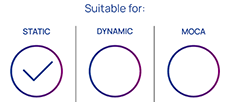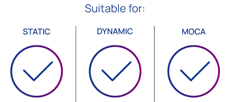ASCMO-GO (Global Optimization)

ASCMO-GO is an add-on that expands the optimization method integrated in ASCMO-STATIC, which takes into consideration the full (global) operating range of an engine during the optimization. This enables, for example, the direct optimization of cumulative emissions and fuel consumption while maintaining characteristic map smoothness and adhering to typical driving cycles.
ASCMO-MCI (Model Compression)

ASCMO-MCI enables users to create models with significantly reduced complexity in terms of memory requirements and computing time. Its functionality includes an advanced compression algorithm that reduces the number of basic functions needed for the desired model accuracy. It furthermore includes a module for “symbolic regression”. This provides a special way of identifying functional correlations between inputs and outputs of a given system. Since the resulting model contains only simple mathematical operations, it is usually uncomplicated and efficient and can most likely be executed on a real-time critical system. In addition, these models are typically physically interpretable, thus making it possible to also use the highly accurate ASCMO models in real-time critical environments like ECUs.
ASCMO-ME (Model Export)

ASCMO-SDK (Software Development Kit)

ASCMO-SDK provides a MATLAB® interface to ASCMO. This allows ASCMO to be controlled remotely via a command line as well as via scripts, and it allows user-defined functionalities to be integrated into the ASCMO environment. These can be, for example, any kind of visualization or data processing or even modeling and optimization algorithms. Moreover, this interface can be used to establish a connection to test bench automations.
ASCMO-SIG (Signal Trace Modeling)

ASCMO-SIG enables users to create signal curve models, such as cylinder pressure curves based on static inputs. The dependencies of the signal curves on the input parameters can be visualized and optimized with respect to a target curve.